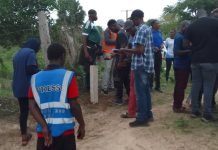By Mustapha Jallow
Researchers, doctors and experts from the Medical Research Council Unit, the Gambia (MRCUG) of the London School of Hygiene & Tropical Medicine (LSHTM) have revealed in their new study that many childhood vaccinations are delayed throughout the country – with potential implications for disease outbreaks.
MRCUG made this revelation during their dissemination session of findings of EDCTP-which was conducted in the Gambia over the last three years. This was part of the EDCTP2 programme supported by the European Union.
The purpose of the study, according to the organizers, was to understand if children in the Gambia were getting their vaccines on time – according to the national childhood vaccine schedule.
“We adopted a multi-dimensional approach to determine the timeliness of vaccination (i.e., timely, early, delayed, and untimely interval vaccination). We utilized data for 3,248 children from The Gambia 2019–2020 Demographic and Health Survey. Nine tracer vaccines administered at birth and at two, three, four and nine months of life were included,’’ said the findings.
It added timeliness was defined according to the recommended national vaccination windows and reported as both categorical and continuous variables. Routine coverage was high (above 90%), but also a high rate of untimely vaccination.
“First-dose pentavalent vaccine (PENTA1) and oral polio vaccine (OPV1) had the highest timely coverage that ranged from 71.8% (95% CI = 68.7–74.8%) to 74.4% (95% CI = 71.7–77.1%). Delayed vaccination was the commonest dimension of untimely vaccination and ranged from 17.5% (95% CI = 14.5–20.4%) to 91.1% (95% CI = 88.9–93.4%), with median delays ranging from 11 days (IQR = 5, 19.5 days) to 28 days (IQR = 11, 57 days) across all vaccines.’’
The researchers used the birth dose of hepatitis B vaccine (HepB0), the third dose of pentavalent vaccine (PENTA3), and first dose of the measles- containing vaccine (MCV1) as study cases.
“The birth-dose of Hepatitis B vaccine had the highest delay and this was more common in the 24–35 months age group (91.1% [95% CI = 88.9–93.4%], median delays = 17 days [IQR = 10, 28 days]) compared to the 12–23 months age-group (84.9% [95% CI = 81.9–87.9%], median delays = 16 days [IQR = 9, 26 days]). Early vaccination was the least common and ranged from 4.9% (95% CI = 3.2–6.7%) to 10.7% (95% CI = 8.3–13.1%) for all vaccines.”
The Gambia’s childhood immunization system requires urgent implementation of effective strategies to reduce untimely vaccination in order to optimize its quality, even though it already has impressive coverage rates. On vaccination of the pentavalent vaccine (PENTA3) predicted prevalence at the District level ranged from 25.7 percent to 54.1 percent. Among the seven districts with a delay of 50 percent or more, 4 were located in Basse, 2 in Janjanbureh and 1 in Banjul. While the predicted prevalence of measles-containing vaccine (MCV1) vaccination at the district level ranged from 22.7 percent to 40.2 percent.
For vaccines to work the way they are supposed to work, Dr Oghenebrume Wariri, a research fellow and pediatrician at the MRC said children’s vaccines need to be given both a high coverage and in a timely manner.
“We need both to come together. Our work is to try and see what problems are with timeliness so that we can pass the message to the community and the EPI personnel. This will ensure that we rally round together and ensure that our coverage is high and our timeliness; also, will be high so that we get the benefit of vaccination for all children across the Gambia,’’ he says.
Factors responsible, according to Dr Wariri, could be on the supply side, families bringing their children, long distances from the clinic, and unavailability of hepatitis B vaccine immediately after birth, supply chain constraints.
“Covid-19 impacted timeliness in some regions. We are doing well but more needs to be done,’’ he added.
Sidat Fofana, the Program Manager for Expanded Program on Immunization (EPI) Gambia explained the dissemination of an outcome of research that was conducted in the country.
He also talked about how people were not taking their vaccination at the right time during COVID-19. He stated that such has a major implication on morbidity and mortality in children.
“If a vaccine like measles is taken too early, the maternal antibodies will affect the usefulness of the vaccine and if taken too late it may not be protective and the child may pick up infection,’’ Fofana warned.
According to him, study like this one; will definitely help point our attention to the fact that timeliness of vaccination is important.





















